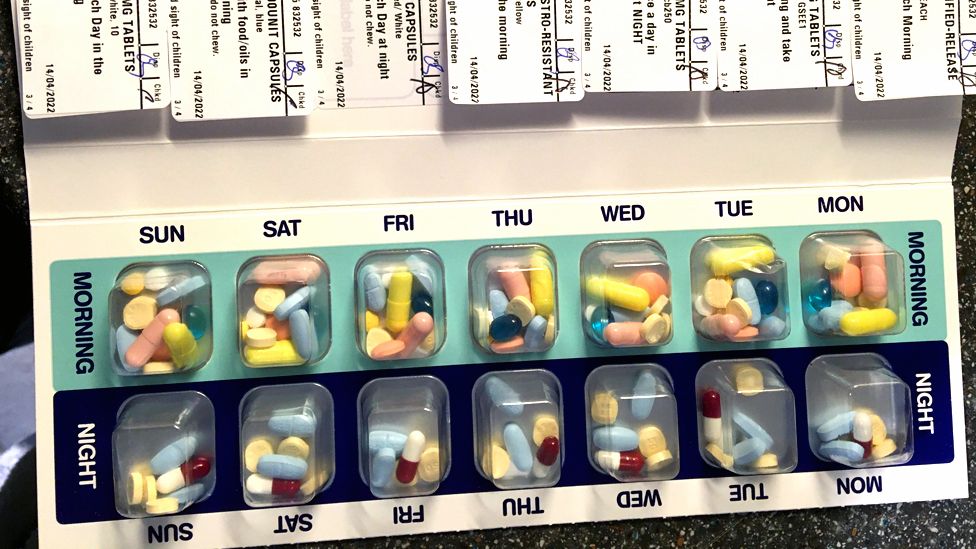ARTICLE AD BOX
By Hugh Pym
Health editor
 Image source, Contributor
Image source, Contributor
The boxes allow people to see what medicines should be taken at certain times of day
Some pharmacies run by the High Street chain Boots have been criticised for telling some patients on multiple drugs that they can no longer have blister pack boxes, known as dosette boxes.
Weekly pill organisers can help users keep track of their daily medication and stay safe.
Pharmacists put the tablets into individual boxes in the trays, each one indicating when they should be taken.
Boots said the aids were "not always the most appropriate option".
Image source, Family
Image caption,Pat Garner needs to take several types of medication
The boxes, known in the industry as multi-compartment compliance aids (MCCAs), are delivered to patients' addresses.
They have seals which, when broken, indicate to a patient or their carer if the medication has been taken.
Tracey Hobbs' mother, Pat Garner, lives at home with care visits.
For several years, she has had MCCAs provided by her local Boots pharmacy. She takes more than 15 pills each day.
Tracey says she was phoned by Boots and told that from one month later her mother would receive all the drugs in the original packaging, rather than organised into morning and night doses for each day of the week.
Tracey told the BBC: "I pointed out that the blister packs were the only way we could know she had taken her medication at the right time. Handing seven individual boxes with different instructions on each one was totally unworkable and - quite frankly - dangerous".
A Boots spokesperson said: "The latest Royal Pharmaceutical Society guidance indicates that the use of multi-compartment compliance aids is not always the most appropriate option for patients that need support to take their medicines at the right dose and time.
"Pharmacists are speaking with patients who we provide with MCCAs to discuss whether it is the right way to support them, depending on their individual circumstances and clinical needs.
Alternative support might include large-print labels and a medicines reminder chart. In many cases, MCCAs will remain the most appropriate option for the patient, and we will continue to support them in this way."
The Royal Pharmaceutical Society has said in guidelines drawn up before the pandemic that there are benefits and disadvantages with use of the dosette boxes: "A multi-compartment compliance aid is one tool amongst many to help with medicines use but other interventions also exist, which as part of a person-centred and quality approach, must also be considered."
It is not clear how many other pharmacy chains are withdrawing the boxes. The Association of Independent Multiple Pharmacies says most of its members are continuing to supply patients with MCCAs if they are requested, even though the process is costly.
Superdrug and Lloyds Pharmacy say they continue to offer MCCAs.
Prof Gill Livingston, an expert in elderly medicine at University College London, said she was concerned to hear that some patients and their families were being told the boxes were being scrapped.
She said: "Blister packs enable people with mild dementia or some memory problems to take their own medication and remain independent. They can check that they have taken it and they know they have taken the right thing, as it is already sorted out.
"Later on in dementia or with other disabilities, it enables paid carers and families to help them take their medication and remain in the community and remain as well as possible."

 2 years ago
69
2 years ago
69








 English (US) ·
English (US) ·